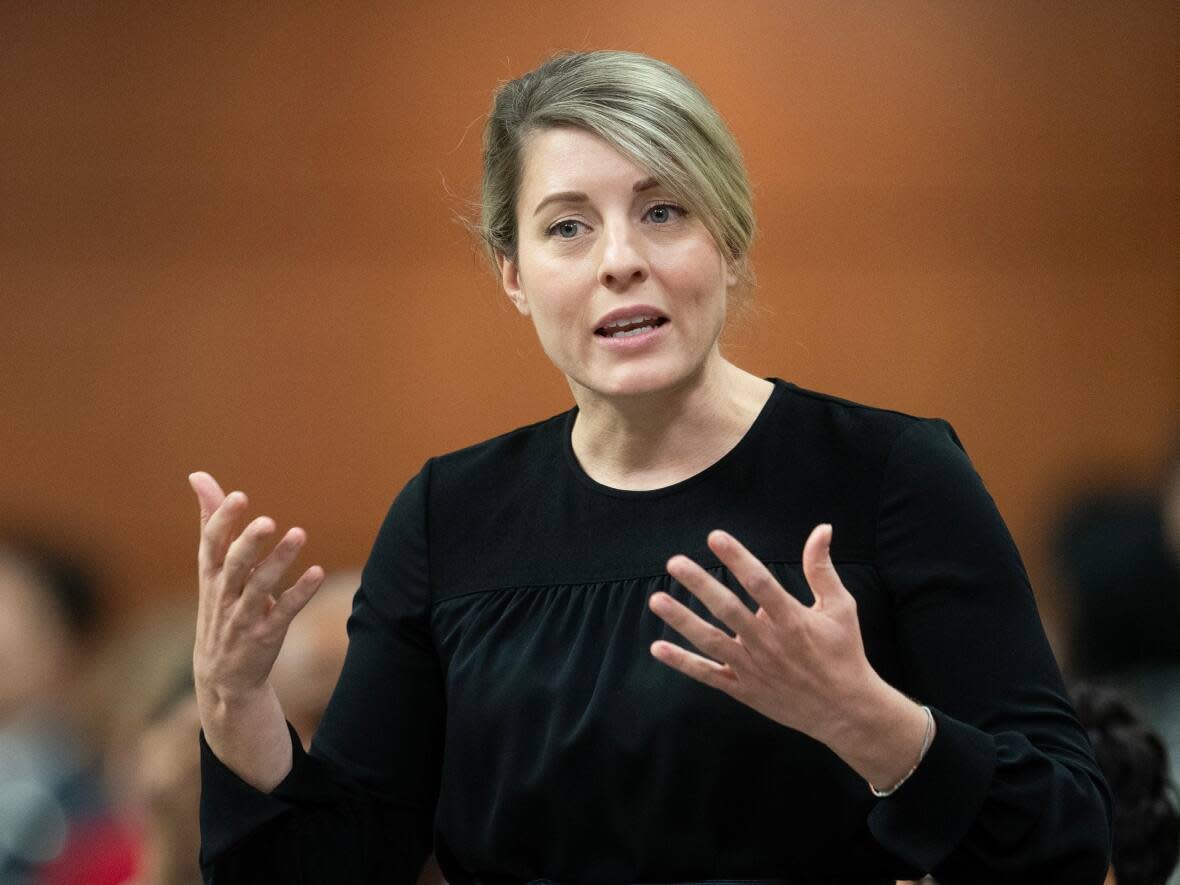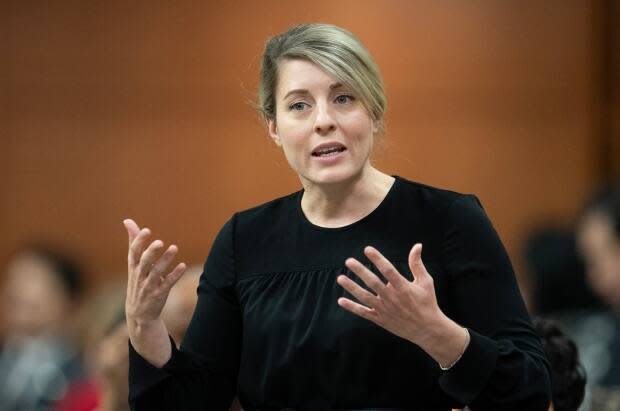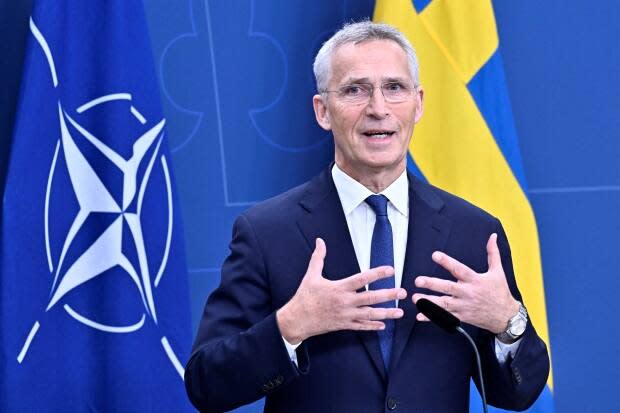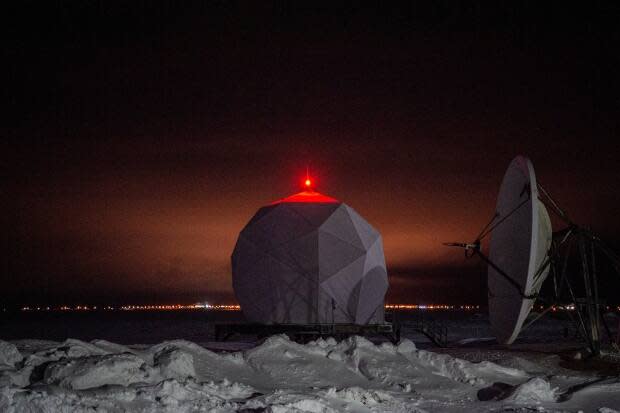Trump's NATO comments aren't cause for panic — but they should be taken seriously, experts warn

- Oops!Something went wrong.Please try again later.
- Oops!Something went wrong.Please try again later.
There was a "keep calm and carry on" vibe outside the House of Commons on Monday as a political storm blew up over Donald Trump's threat to encourage Russia "to do whatever the hell they want" to NATO members he thinks aren't paying their fair share of the cost of collective defence.
Despite harsh condemnation of the Republican presidential frontrunner's remarks from allies in Europe, and strong words from the NATO secretary general, two federal cabinet ministers in Ottawa took a more measured, restrained approach to what they'd heard.
One expert was pleasantly surprised with the understated nature of the responses from Defence Minister Bill Blair and Foreign Affairs Minister Melanie Joly — but others warned there can be no room for complacency and said important security arrangements beyond NATO could be thrown into chaos if Trump returns to the Oval Office.
"I'm not going to get drawn into political rhetoric in another country," Blair told reporters Monday when asked about the former president's campaign speech last weekend.
"I don't think we need to overreact, but I think we need to make sure that we are prepared and that we continue to keep our alliances strong."
Trump, who is running for re-election in November, said during a weekend campaign event that he would encourage Russia to do "whatever the hell they want" to any NATO member country that doesn't meet spending guidelines. He said he would not offer such a country U.S. protection.
Blair said his responsibility is to the defence of Canada. He cited the billions of dollars the Liberal government has committed recently to buying new fighter jets, drones and surveillance aircraft.
Joly focused on NATO solidarity, claiming the military alliance is "more united than ever" following the inclusion of Finland and the eventual arrival of Sweden.
When pressed about Trump, she said, "The American people will decide, and meanwhile, we'll be ready for their choice. We have been able to manage two types of administrations in the White House."

Given domestic politics in Canada and the attempt by the governing Liberals to paint Conservatives — particularly Opposition Leader Pierre Poilievre — as MAGA-lite, foreign policy expert Balkan Devlen said he was happy to see the government take the political high road.
"I would've actually expected a bit more of a partisan take on it, which I'm glad they didn't," said Devlen, a fellow at the Ottawa-based MacDonald-Laurier Institute.
"This is the most important relationship Canada has, and we cannot ... afford to meddle in and get into the weeds with the partisan politics in the United States."
Preparing for sustained instability in U.S. politics
Canada, he said, should not be responding to the individual policies or preferences of any candidate south of the border — but the federal government should be thinking deeply and broadly about the relationship with the United States and what is unfolding there.
"What we should be preparing for is not so much X coming to power or Y coming to power, but continuing political instability in the U.S., and what that means for Canada for Canadian prosperity and security," said Devlen.
Still, the implications of Trump's threat sent shockwaves through the alliance over the weekend. NATO chief Jens Stoltenberg has hit back against the notion that member countries would not defend one another.

"Any suggestion that allies will not defend each other undermines all of our security, including that of the U.S., and puts American and European soldiers at increased risk," Stoltenberg said.
"I expect that regardless of who wins the presidential election, the U.S. will remain a strong and committed NATO ally."
The timing of Trump's remarks — not long after former Fox News host Tucker Carlson interviewed Russian President Vladimir Putin — were seen as suspicious by some commentators.
But Stephen Saideman, who holds the Paterson Chair in International Affairs at the Norman Paterson School of International Affairs at Carleton University in Ottawa, said he suspects it's personal for the former American president.
"I think he's also still very bitter about being laughed at and mocked by members of the alliance," said Saideman, referring to a hot mic incident at the end of the NATO Summit in London in 2019 — where Prime Minister Justin Trudeau was caught on camera at a Buckingham Palace reception apparently trash-talking Trump, along with former British Prime Minister Boris Johnson and French President Emmanuel Macron.
WATCH: Trump reacts to Trudeau's comments at NATO
Trudeau was referring to an unscheduled, nearly hour-long question and answer session Trump held with mostly Canadian media ahead of a bilateral meeting.
Trump did not let the slight pass and called Trudeau "two-faced" — animosity that Saideman said would be good for us to keep in mind over the next several months as Trump stakes out foreign and defence policy.
"So he's got a lot of resentment," Saideman said of Trump. "And I think a lot of his speeches these days are essentially focused on venting his spleen about his resentments."
The notion of inviting — or allowing — Russia to attack a NATO member that's not meeting the alliance's benchmark defence spending commitment (of two per cent of a nation's gross domestic product) is "not a serious policy option," he added.
But Saideman said he doesn't believe Trump would stop at NATO and could go after the NORAD arrangement, even out of spite, in order to get a better deal for the U.S. — a reference to the longstanding 60-40 split on spending for continental defence.

"I'm not sure NORAD survives a second Trump administration," he said. "I mean, part of what worked well for Canada last time was I don't think he's aware of it."
The United States and Canada have embarked on a multi-billion dollar modernization of NORAD under the Biden administration, but Washington has routinely expressed frustration at the slow pace of Canadian investment and planning.
Saideman said he's convinced that if there is another Trump presidency, more U.S. government officials will be committed to burning down international institutions.
"His administration will be staffed with more arsonists in defence than there was before," said Saideman. "I'm pretty convinced that the next secretary of defence under the Trump administration will be looking for ways to destroy every multilateral arrangement."
In light of Trump's remarks and the political direction of the U.S., both Saideman and Devlan say the Liberal government needs to wrap its head around all of the contingencies — and rule nothing out.
Last December, the U.S. Congress passed legislation that would make it harder for future presidents to withdraw from NATO.
But Matthew Schmidt, an eastern European expert at the University of New Haven Connecticut, said he questions whether the measure actually limits what Trump could do in a second term.
For example, he said, Trump could stop short of formally withdrawing from NATO while also unilaterally choosing not to commit U.S. forces to respond to an attack — an option open to all alliance members, which are given the choice on how to answer an invocation of Article 5, NATO's self-defence clause.
"There would be ways that he could get around whatever Congress does," said Schmidt, who also said he firmly believes NORAD would be up for renegotiation should Trump win.
"If the U.S. pulls out of NATO, Canada is in particular trouble" because of the joint defence arrangements between the two countries and its reliance on American military logistics and other special operations.
"You're really in trouble," he added.

